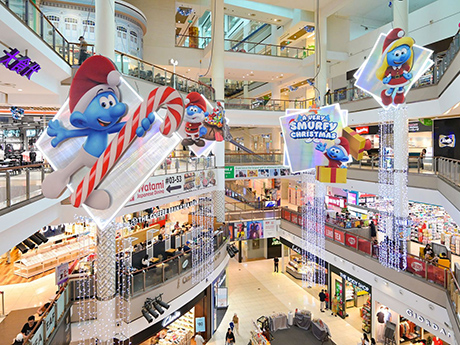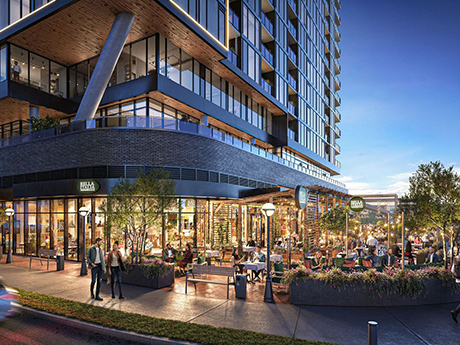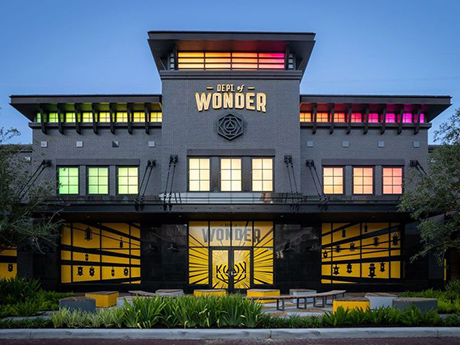The economy has constricted consumers’ wallets, but the desire for entertainment has kept them spending…on the right concepts.
Rising prices have made just about everyone conscientious about their spending. That, naturally, includes shoppers.
Dixon Greenwood, principal at Mountain Mile in Pigeon Forge, Tennessee, notes 2023 overall tax receipts at the dining, shopping, lodging and entertainment destination are down more than 10 percent from the company’s 2022 numbers.
“Now, that’s off some extreme growth during and after COVID, so numbers are still very good, but what it says pretty clearly is people are tightening their purse strings,” he says.
Traffic, on the other hand, is only down 2 percent to 3 percent.
“Fortunately for us, we’re still trending up at our property, but that’s in part because we continued to add additional retailers and experiences last year,” Greenwood continues.
A large part of what’s compelling visitors into shopping centers nowadays is entertainment, especially if prices for goods are lower online.
“There has been somewhat of a drop in consumer spending, but entertainment remains a ‘recession-proof’ outlet,” argues David Goldfarb, owner, CEO and founder of entertainment-solutions company PrimeTime Amusements.
Goldfarb is careful to note, however, that recession-proof doesn’t mean bulletproof. After all, entertainment falls under the discretionary spending category, which means the choice on whether to spend — and where to spend — lies solely with the consumer.
Capturing Dollars
One of the best ways to keep those dollars flowing is to keep the novelty train moving.
“With the current financial climate as uncertain as it is, we do see audiences seeking out unique offerings for their discretionary funds,” says Limbert Fabian, a partner in the Experience Trust and co-founder and co-head of creative for the Department of Wonder, an Experience Trust destination in Houston. “I think the world is looking for activities and entertainment that they can say they participated in, that stands out from the traditional formats. I am excited at the spaces in which the audience can have a moment they can’t wait to tell someone else about.”
The Department of Wonder at Sugar Land Town Square, for example, offers a mixed-reality fantasy that blurs the lines between the physical and digital worlds.
Mathew Focht, CEO of Emerging, which optimizes restaurant and entertainment concepts for sustainable growth and profitability, notes that while unpredictability can be unpleasant, unexpected twists can delight in today’s day and age.
“People want to be surprised,” he says. “Our concepts provide experiences with unknown outcomes, which is the ultimate surprise.”
Some of Emerging’s concepts include the Museum of Ice Cream, F1 Arcade, Sixes Cricket and Sandbox VR. Like it or not, Bucky Mabe, CEO of FACE Amusement & Hospitality, which owns and operates a collection of entertainment experiences, believes concepts will have to continue surprising, delighting and reinventing if they want to remain a compelling offering.
“The consumer today has much higher expectations than the consumer of the past for location-based entertainment,” he says. “We are required to create new ways to engage with the guest to keep the offerings relevant and surpass those expectations, because while consumer spending has decelerated in most industries, they are still finding value in spending their hard-earned money on experiences.”
Craig Winning, managing director of immersive baseball simulator experience Batbox, believes that today’s successful concepts need to have a unique core offering that captures the imagination.
“Consumers are now more conscious and intentional with spending, choosing carefully where and with whom they spend their money,” he says. “They prefer personalized experiences, enjoy experiential activities, and look for flavor-forward culinary and beverage offerings. They also appreciate the integration of technology and simplified ordering systems. Brands delivering these experiences at scale will have an advantage in the competitive socializing market.”
Accessibility will also give concepts a competitive edge. Batbox, for example, caters to both seasoned and amateur baseball enthusiasts. Those who are passionate about the sport can create a frequent player profile or participate in league tournaments. Others can simply enjoy the central sports bar and dining area.
Offering a family-friendly experience that appeals to all ages is another way to bring in visitors (and their wallets). The Department of Wonder bills itself as an attraction “for adventurers of all ages, from 4 to 104,” according to its website. It offers birthday parties for children, as well as after-dark experiences for those 21 and over.
“When I consider family activities, I think, ‘why not do something memorable or unique that the whole family can enjoy?’” Fabian adds.

Alex Patterson, CEO of Beat the Bomb, notes that providing a few varied experiences not only gives guests the opportunity to come back again and again, but accommodates a range of ages and preferences. That’s why Beat the Bomb offers a one-hour “mission” that takes a group of guests through five high-tech video game rooms; a one-hour private immersive arcade lounge that offers more than 15 original video games; and a VIP experience that combines the two.
“We have a very broad audience that includes welcoming thousands of families and child birthday parties annually,” Patterson says. “We also host school groups that fall under our STEM education programs, in addition to hundreds of corporate groups who participate in team-building events each year.”
Chicken N Pickle, an indoor-outdoor entertainment complex that includes food, yard games and pickleball, has taken the idea of family friendly and accessibility a step further. Not only does it allow dogs on-site, but it has ensured its pickleball experience can accommodate a range of abilities.
“Anyone can play pickleball,” says Kelli Alldredge, president of Chicken N Pickle. “We really believe that, and we have specially made sports/pickleball wheelchairs available at every location, re-emphasizing our commitment to inclusion.”
Winning on Price
Like other concepts, Alldredge notes Chicken N Pickle is not blind to the increasing costs of, well, everything nowadays. This has caused the company to re-examine its offerings in a bid to remain competitive and family friendly.
“We have stayed so focused on creating an inclusive environment where everyone feels welcome and that everyone can afford to be a part of,” she says. “We’ve looked at our outdoor court prices and happy hour prices and we’ve adjusted them to reflect the state of the current market.”
With that in mind, Chicken N Pickle also offers a litany of free activities, including Jenga, cornhole, battleship and ping-pong.
“Our goal is for people and their families to spend hours on our property, and we’ve found that a great way to do this is to supplement our main income sources with free activities so that people can wander around our property and experience the community we seek to build,” Alldredge adds. “We want to foster an environment where people can come and disconnect from their cell phones without worrying about what it’ll cost.”
Goldfarb notes that it’s never a bad idea to let the consumer know they’re getting a good deal, either.
“If you have to raise your prices to keep pace with inflation and costs, you can’t let your customers feel like they aren’t getting a deal anymore,” he says. “Because repeat customers notice when there’s an uptick in prices. Packages, bundles, combos and promos remain essential.”
PrimeTime’s Elev8 Fun concept, for example, offers “Power Packs” that help customers maximize their savings and entertainment by bundling its offered activities, such as laser tag, mini golf, ropes course and a virtual reality experience. These Power Packs allow customers to save up to 30 percent, while other activities like go-kart racing can be purchased as an add-on. Discounts are also offered from Monday through Thursday.
“You have to remain innovative in the value you offer to customers,” Goldfarb says. “We want customers walking out of our centers not only happy, but feeling like they got a good value.”
Conceptualizing Costs
Of course, consumers aren’t the only ones feeling the pinch today. Shopping center landlords, entertainment concepts, and investors and developers of both are also watching their costs rise.
“The biggest issue for us has been the massive increase in construction costs,” Greenwood asserts. “While we’ve seen those costs come down a little bit, everything is still drastically higher than it was just a few years ago.”
That’s why Greenwood’s a fan of retrofitting existing space.
“It can provide some significant savings over new construction and make projects feasible that aren’t otherwise,” he adds.
The renovated space that was previously Belz Mall in Pigeon Forge now serves as Phase I of Mountain Mile. Greenwood is also gearing up to redevelop the Myrtle Beach Mall in South Carolina into a project that’s tentatively named The Intracoastal.
Mabe shares Greenwood’s affinity for retrofits…and for the Myrtle Beach Mall, which the company recently purchased.
“We see the largest opportunity for growth in purchasing and redeveloping value-add retail assets and using our concepts as anchors to bring the assets back to life,” he says. “This mall is in an excellent location and boasts more than 500,000 square feet over 60 acres, with Bass Pro Shops as a current anchor tenant.”
FACE is working to bring Downtown Flavortown, a collaboration with celebrity Chef Guy Fieri, to the redevelopment as a co-anchor. Downtown Flavortown will feature a 300-plus-seat restaurant showcasing Fieri’s culinary creations; a 14-lane duckpin bowling alley; a state-of-the-art arcade; full-service tropical Tiki bar; a 1968 Chevy Camaro that will offer photo opportunities; and options for private parties.
“It is a place where visitors and locals alike can revel in the perfect harmony of food, fun and shared memories,” Mabe adds.
Chevys, bowling alleys and tiki bars don’t come cheap, though. Even if utilizing the existing space saves you some money. That’s where expertise and efficiency come in, Greenwood notes.
“I think you need to be as efficient as possible with the design of the things the public doesn’t see or care about, but you can’t cheapen the experience,” he explains. “It’s an art, but finding competent architects and engineers who don’t spec outrageous mechanical/electrical/plumbing requirements can go a long way. Nobody needs a gold-plated toilet unless, of course, that’s part of the experience.”
Fabienne Gilles, chief commercial officer and head of consumer products at IMPS – The Smurfs, notes her company is also focused on development. This includes its family entertainment activities, such as a touring exhibition, live show and family entertainment centers.
“The COVID period was a lot, impacting our Smurf family entertainment activities,” she says. “Things restarted quite slowly right after due to the economic climate. Now, we see a bigger opportunity for new projects and investments as there’s a pent-up demand for in-person socialization and an appetite for experiences.”
Now may also be the right time to develop as Gilles wants to be sure she and her team can capitalize on the recent television series, as well as the Smurf movie, which is due out in 2025.

“The release of a Paramount Smurf movie will boost the franchise, attracting both existing fans and new generation viewers,” she continues. “Smurfs are a good choice for family entertainment centers due to their widespread appeal across generations. They create a nostalgic and engaging atmosphere. Incorporating Smurfs into entertainment experiences can attract both parents who grew up with the characters and children who are discovering them through the new TV series.”
Executing goals on your own timeline (versus the market’s or economy’s) is a sound strategy, Patterson says. That’s because there will always be external forces and challenges that don’t align with your vision.
“Avoid getting distracted by macroeconomic factors and focus on the entertainment experience for your customers,” he advises. “Entrepreneurs cannot control interest rates, inflation or global pandemics. But we can control the quality of our guest experience and how people will speak to their friends and family members. Smart investors look at where your concept can be in five years. Demonstrating product-market fit and building a high-caliber management team are of paramount importance.”
Timing is also on the mind of Nick Garzia, vice president of retail leasing for the CIM Group, which is transforming 50 acres of parking lots adjacent to State Farm Arena and Mercedes-Benz Stadium in Atlanta into a mixed-use destination that features entertainment as a major component. Centennial Yards will open a luxury hotel and residential building, both of which will feature retail and restaurants at their bases, in mid-2025, right before the area becomes a global stage.

“Our entertainment district will debut in 2026 in time for the FIFA World Cup, which will be played across the street at Mercedes-Benz Stadium,” Garzia notes. “Our site is directly across the street from two world-class sports venues that host over 200 events per year. Post-COVID, a large part of what has been successful has been the entertainment-driven experiences. We plan on delivering on that in Centennial Yards, with a healthy dose of experiential and immersive entertainment concepts, social gaming, live music, and diverse food and beverage offerings.”
Howard Samuels, president and CEO of real estate advisory, development and brokerage firm Samuels & Company, believes now may be the ideal time to act if you’re an entertainment concept. He’s witnessed shopping center landlords not only welcome more concepts into their destinations, but create entire wings for them. This sort of clustering can be extremely advantageous for all, Samuels notes.
“In the last year or two, it appears there are starting to be ‘cracks in the ice’ within the industry in which some landlords are awakening to the needs to combine location-based entertainment (LBE) tenants in one place,” he says. “By combining a few retail entertainment uses or LBEs together in one setting, it enables customers to be entertained often in the same place.”
Samuels points to Westfield Garden State Plaza in Paramus, New Jersey, Grapevine Mills in Grapevine, Texas, and Great Lakes Crossing Outlets in Auburn Hills, Michigan, as centers that have created successful LBE clusters.
These clusters can be strategic when the businesses are mutually beneficial to one another.
“Our location will absolutely drive foot traffic to the respective centers we enter,” Alldredge adds. “Chicken N Pickle is next to a bowling alley in Wichita, and since we opened there in 2018, the owners have communicated to us that their business sales have actually increased.”
Chicken N Pickle recently opened its ninth outpost in St. Charles, Missouri. Its tenth store will open in February in Webster, Texas. Other concepts are also looking to expand despite current economic conditions. These include Beat the Bomb, which will be adding new units in Philadelphia, Charlotte, Denver and Houston, expanding to three other cities by mid-2025 and aiming for about 50 open locations by the end of 2029.
“We are looking to partner with landlords who want a new world-class social entertainment experience in their properties, based on interactive video game technology,” Patterson says.
He also believes his concept caters to price-conscious consumers, providing a night out for about $50 per person.
“Material possessions go down in value over time, but experiences and the memories they create only appreciate in value,” he continues.
Batbox is also looking to expand, opening its first U.S. location in Texas later this year. Though Winning is excited to expand, he admits it hasn’t necessarily been an easy process in this environment.
“Given the current market uncertainties, it has been quite challenging to pitch for investment,” he says. “It has been even more challenging as a Mexico-based company launching into the U.S. without any proof of concept within the USA.”
He was able to overcome these hurdles, Winning notes, by finding the right funding partners and property owners who shared his company’s vision of growing baseball within the U.S.
Greenwood also thinks today’s economy may separate the winning concepts from the losing ones.
“I do believe there’s money available in the private equity markets for entertainment concepts that have compelling models,” he says. “And we are looking for new and exciting entertainment concepts for our projects. While that might sound pretty obvious, there are a ton of ‘new and interesting’ concepts out there, so the real focus is finding ones that have sustainable business models and capital.”
PrimeTime Amusements is another group looking to further its reach, particularly with its Elev8 brand. The company is looking to acquire more department stores with a keen eye on Florida.
“Florida is always growing, so as long as there are good properties coming to market in good trade areas, then we will always have opportunities to grow,” Goldfarb says. “In fact, in Florida alone there’s plenty to keep us busy, but specifically the west coast of Florida is starting to become attractive in its own right.”
Greenwood is also bullish on destination markets.
“I’m a huge believer in tourism markets for entertainment and retail, so that’s where I’m focused,” he says. “If I was a retailer or entertainment concept looking for growth, I would focus on tourism markets with flagship experiences because you get to expose your brand to as wide a swath of the population as possible. People will make small sacrifices all year in order to keep that annual family vacation alive.”
For those reasons, Greenwood feels confident that markets like Orlando, Branson, Missouri, Myrtle Beach, South Carolina, and Pigeon Forge, Tennessee, will continue to perform “year after year.”
Experience Trust is also looking to branch out, but with a new concept, rather than a location expansion.
“We are developing an arcade concept,” Fabian says. “Arcades attract people because they’re places that audiences are familiar with but once inside, we are literally blowing up the idea of an arcade with over-scaled bays that look like classic cabinets but are arenas for communal play. We love telling stories — and hooking people through the familiar — but taking them to the unexpected.”
Renovations, expansions and new offerings can all serve to captive and excite. Still, there remains one problem with providing something new and novel.
“In today’s environment, it costs a lot more to be wrong than it has in the past,” Mabe cautions. “So, my advice would be to make sure you have a winning concept. With so many new concepts coming online, you must ensure you have a unique edge in the marketplace. What is different than putting a bunch of attractions together and calling it a family entertainment center? What can you offer that no one else can? Distinctiveness is what sets your concept apart in a market saturated with options.”
— Nellie Day
This article originally appeared in the January 2024 issue of Shopping Center Business magazine.


